|
The Pioneer
Theatre Review by Cindy Pierre
Considered by many to be the father of modern drama, Eugene O'Neill has garnered his fame from his full-length works and his ability to spread his awareness of human frailty, obligation and yearnings across the stage like a deluge. But few know that he dabbled in short works before his 1920 Broadway debut with Beyond the Horizon. Five of these rarely produced playlets have been strung together like beads in Metropolitan Playhouse's The Pioneer: 5 Short Plays by Eugene O'Neill. Directed by Mark Harborth, these four one-acts and monologue represent the drips before the floods, and are definitely precursors in theme and sometimes gravity to his longer works. Although they are intertwined for a uniform performance, they are uneven in entertainment value and depth.
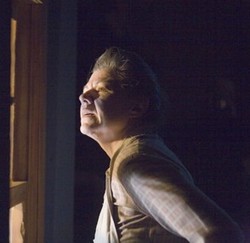
Before Breakfast: Sidney Fortner.
|
In "Before Breakfast" (1916), Mrs. Rowland (Sidney Fortner) quietly lambastes her husband for squandering their possessions in lieu of getting a job as he gets ready to start his day offstage. Fortner tries to engage her husband by frequently coming to a door that remains ajar, but we rarely get the impression that she believes that she is speaking with someone. Fortner's voice waxes and wanes, and the occasional lack of enunciation causes a rift between the audience and her character. Additionally, her insults sound hollow because they come from such a timid voice and a reserved demeanor, even if her husband is only meant to hear a fraction of them. O'Neill conveys domestic convenience and complacency in this monologue, but the performance never stirs any emotion. Maryvel Bergen's dreary lighting, although genuine to the time of day, also induces drowsiness. The tone and energy of the plays that follow suggest that "Before Breakfast" should be sandwiched between some of the peppier pieces. It is simply not the right introduction for The Pioneer.
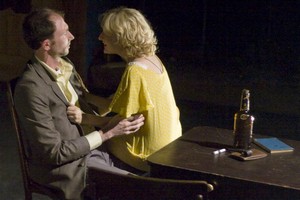
Ile: Andrew Firda and Keri Setaro.
|
We segue smoothly into "Ile"(1917), a drama about an obsessive whale-hunting captain and the wife and crew he holds captive on his ship to pursue his goals. Captain Keeney (Andrew Firda) could easily be dubbed Captain Ahab, fervent in his determination to once again return from an expedition with a ship full of whale and "ile" (oil) , and not a whale less. Mrs. Keeney (Keri Setaro), his frail wife, has made the mistake of joining him on his travels this time, unprepared for the rigors of sea life and disturbed by the confinement and dismal cakes of ice. Captain Keeney's refusal to return home after two years of hunting whale ultimately drives his wife insane. This play is much livelier than the last, and has momentum and a great element of thirst. O'Neill focuses on different forms of loyalty, and does so succinctly. Here, he also wallows in his Irish heritage. Although Mrs. Keeney's plea for her husband's understanding arrives late in the play, her situation is compelling. Her madness, however, is treated with much more subtlety than expected. A more flagrant approach to her insanity may have gotten a different rise out of her husband, and therefore, made the conclusion more disturbing.
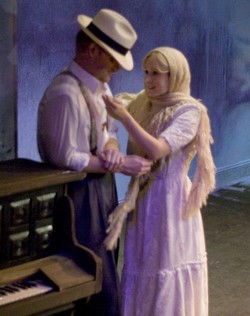
The Movie Man: Michael Hardart and Keri Setaro.
|
"The Movie Man" (1919) centers on an interpretation of Pancho Villa's Mexican revolution and the United States' part in financing it. The U.S. Is represented as Earth Motion Picture Company, and Henry Rodgers (Michael Hardart) and Al Devlin (David Patrick Ford) are its employees. Pancho Gomez (renamed from Villa here and played by Ron Dreyer) has made a deal with the Earth Motion Picture Company to only stage pillaging and executions in the daylight, prime light for film making. On the eve of the next execution, a tearful Anita Fernandez (Keri Setaro), daughter to the executionee, comes to beg for his life. Rodgers succumbs to her entreaties and her desperation, and agrees to help by bargaining with the belligerent Pancho. This comedy explores some very spicy political views, and does so with gusto. Dreyer is an outlandish Pancho, and his grandiose, coarse behavior matches the boldness of the play. The remainder of the cast all use nuance to their advantage, conveying much more than their simple frames suggest.
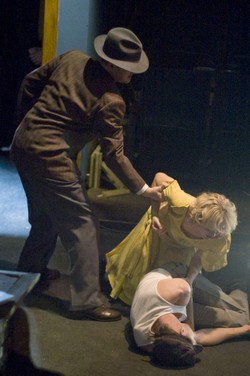
The Web: Michael Hardart, Keri Setaro and David Patrick Ford.
|
A hard luck prostitute with tuberculosis and a kid deals with her pimp boyfriend in "The Web" (1913-14). Rose Thomas (Keri Setaro) works hard, but plays never, particularly since her pimp Steve (Andrew Firda) keeps bleeding her dry. Tensions escalate when he demands that she put her child in an orphanage, but she vehemently opposes it. Before things get too dire for her, in comes hard luck burglar Tim Moran (David Patrick Ford) to the rescue with the cops on his heels.
He can't bear to see a dame in too much distress, revealing that this isn't the first time that he's listened in to their arguments from his room next door. Rose and Tim cling to each other as two souls struggling to do right, but finding all sorts of obstacles in their way to progress. O'Neill has written some snappy dialogue using lower-class lingo, and the cast has fun with the character-driven piece. It captures a snippet of time, but doesn't deal well in real time: there is simply too much going on too quickly for its short running time. It is, however, the most entertaining play of the production and arguably the most pessimistic. Here, the notion of reform can only be a fantasy, but its gray perspective fits right in with some of O'Neill's longer plays.
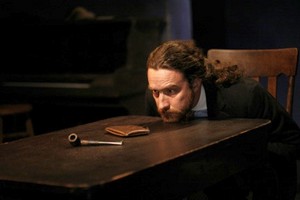
The Last Will and Testament of Silverdene Emblem: Alex Roe.
|
The final play is self-explanatory from the title: "The Last Will and Testament of Silverden Emblem O'Neill" (1940). Here, Blemie (Alex Roe) distributes his possessions among his loved ones, recalling fondly his memories as a pup and what made his life as a dog grand. His eloquence, selflessness and humility are all evident, making him a most distinguished dog and deserving of a voice. Roe effects the posture of a dog in the beginning to elicit some smiles, but delivers the rest of the monologue as a person. And it's a good thing too. This monologue doesn't need any more antics to contribute to the lunacy, even if it is a sweet tribute to a beloved pet.
The Pioneer reveals some of O'Neill's early sketches, and thankfully, not all of the writing styles and themes were developed. There is, however, some evidence of his maturing wit and facility with vulnerability and the truth. If anything, O'Neill enthusiasts will get an opportunity to see their master in imperfect form, much like the characters that make his work so potent.
The Pioneer: 5 Short Plays by Eugene O'Neill
Through December 9
Metropolitan Playhouse, in the Cornelia Connelly Center at 220 East Fourth Street (easternmost door) between Avenues A & B in the East Village
TICKETS: Call 212.995.5302 to purchase tickets, or visit www.metropolitanplayhouse.org
|
